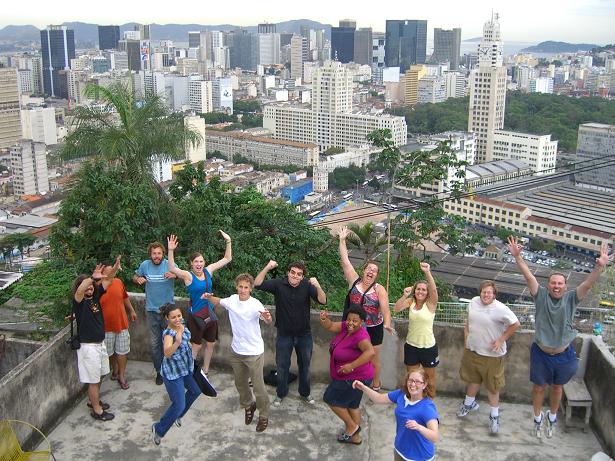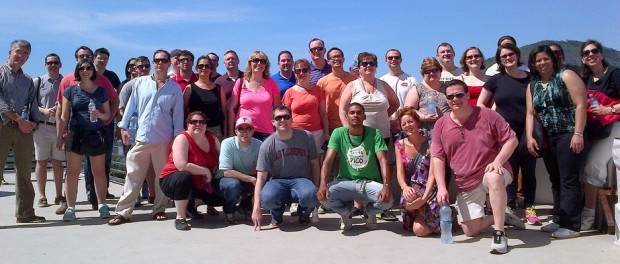Visit Us: Request an Educational Community Visit
Background
 Since 2004 Catalytic Communities has worked with groups from visiting universities, graduate researchers, journalists, conference goers, and volunteer groups to provide tailored educational visits to favelas across Rio de Janeiro that support their specific research, service and educational needs.
Since 2004 Catalytic Communities has worked with groups from visiting universities, graduate researchers, journalists, conference goers, and volunteer groups to provide tailored educational visits to favelas across Rio de Janeiro that support their specific research, service and educational needs.
[If you are on a private trip or with a small group, we recommend you contact favela-based tour operators directly by choosing among those featured here.]
Together with local community partners, we’ve led over 1,500 visitors from 20 countries through a wide range of favelas: ‘pacified’ and non-pacified, economically vibrant and residential, large and small, old and new, steep and low-lying. We look to engage visitors with the favelas they visit, either through direct volunteer service, the publication of articles voicing community concerns, supporting relevant research, or ongoing awareness-raising around the issues faced by residents beyond their departure.
Guided by local leaders, rather than large NGOs, government officials or tourism companies, one gains a deeper and more complete understanding of the unique character, achievements and challenges of that favela, while also benefitting the local community. Local leaders know everything about a community, from its geography and demography, to how infrastructure and politics work, to the local hotspots and cultural engines that drive the neighborhood. Most importantly, they provide insights that others may gloss over or simply do not have, allowing visitors to gain a truer picture of local dynamics and have their questions answered. They, in short, are the most knowledgeable guides to Rio’s favelas.
Logistics

Louisville Presbyterian Theological Seminary visit to Providência with community photographer Maurício Hora
A typical community visit takes 4 hours including travel, but shorter and longer visits are sometimes arranged based on the needs of participants. The visit includes a discussion with CatComm staff about the broader political, cultural, social and economic context of Rio, and a direct look at the details of the community in question through the eyes of local leaders. CatComm staff also provide translation assistance.
CatComm requests donations of US$60-$80 per visitor ($80/visitor for 1-9 people, $70/visitor for 10-19 and $60/visitor for parties over 20). Donations are divided equally to benefit the community organization receiving visitors and sharing their community’s stories, and Catalytic Communities, which organizes the visit and provides contextual information and translation (to English) throughout. The entire donation directly supports Rio’s favelas.
Scheduling a Visit
If you are interested in learning more or scheduling a community visit, please contact us at visit@catcomm.org, providing the following information:
- Date/s and time/s available.
- Address where you are staying.
- Size of the group.
- Nature of the group (university, journalists, conference-goers, tourists, local network, etc.).
- Professional interest/s of group members.
- Thematic interest in Rio’s favelas (if there is something in particular you would like to learn about).
We will then reply suggesting appropriate visits and then coordinate with local leaders accordingly to help design your visit.
Recommended Reading
Readings critical of traditional ‘favela tours:’
- ‘Favela Tour’ tag on RioOnWatch
- New York Times article Slumdog Tourism
- Tourism Concern’s Action for Ethical Tourism page on ‘slum tourism’
- Observer article Before You Pay to Volunteer Abroad, Think of the Harm You Might Do
- Tucker Jordan’s 3-part analysis on tourism in Rio’s favelas: 1, 2, 3
- Social Constructions of the Favela Series, especially Part 3: Favela Tourism as Resistance
- Al Jazeera article Favela-dwellers challenge exotic tours
- Bulletin on Latin American Research‘s Ghettourism and Voyeurism, or Challenging Stereotypes and Raising Consciousness?
We do not run corporate “favela tours” but rather non-profit educational visits for universities and journalists who we hope will engage with the community during and after their visits and whom we hope will carry the awareness produced far and wide. We also encourage you to read up on current events in the community you’ll visit beforehand by searching for it on RioOnWatch. We can also provide specific reading materials should you request them.
Past Visits
In the past CatComm has organized visits for the University of Pennsylvania Graduate School of Design, Harvard Graduate School of Design, the University of North Carolina Chapel Hill Kenan-Flagler Business School, CIEE, Montana State University Architecture Department, Institute for Management Development, University of Delaware Latin American and Iberian Studies, Syracuse University Department of Anthropology, Carleton College, Georgia Tech Sam Nunn School International Affairs, Augustana College, Louisville Presbyterian Theological Seminary, the University of Cincinnati School of Planning, Yale University, Florida International University, University of Cincinatti, Dayton Ohio Chamber of Commerce, NuVu Studio, Odyssey Project, and conference-goers at the 2010 World Urban Forum and 2012 Rio+20 UN Conference on the Environment.
Visitor Testimonials

St. Josephs University visit to Santa Marta with community organizer Vitor Lira
“The professionalism and patience of the CatComm team in arranging our visit to Rocinha was truly remarkable. I was exchanging emails back and forth to finalize the logistics literally hours before the visit actually happened. I felt as if our group’s visit was the organization’s top priority despite the ad hoc (read: unplanned) nature of the request… Our tour group, members of the Dayton Area Chamber of Commerce, from Dayton, Ohio, was visiting Rio de Janeiro with tours and excursions set up by a global tour company. Amidst the visits to the amazing ‘touristy’ sites of the Marvelous City, the tours did not include an in-depth visit to any favelas. Instead, we looked at them from a distance as we passed by in our comfy coach with the general sentiment as expressed by our guides being that of disdain, that they are ‘slums’ of the poor. Prior to my visit I had heard them described similarly but could not let such a description stand without seeing with my own eyes the residents and their everyday lives. In fairness, one of the tour guides did advise that if we really wanted to visit that it’s good to have a trustworthy guide. That seemed common-sensical… And that is where the amazing CatComm Team and local community leader from Rocinha came in, enabling those in our group who came along on the visit to draw their own conclusions; in summary: debunking the prevailing myth of favelas as slums.” – Justin Smith, Dayton Chamber of Commerce
“During our foreign study trip, our group of architecture students and professors had the opportunity to visit three of Rio’s favelas: Vila Autodromo, Santa Marta, and Morro da Providencia. All three visits were organized by CatComm. I was deeply moved by what I saw in the favelas, and our experiences there have forced me to seriously re-evaluate the direction I am going in architectural practice. I was particularly interested in the conflict that has developed in the city’s attempt to displace the people living in Vila Autodromo for the purposes of the Olympic master plan. I now intend to focus my thesis work around design proposals that could strike a balance between the city’s interests and the interests of the people living in Vila Autodromo. The will of the people, their sense of community, and their ingenuity have created a safe neighborhood with a unique identity. This case highlights many misconceptions about life in the favelas, and demonstrates the need for organizations like CatComm to help empower people and give them a voice in a fight against leaders who are willing to displace them from the homes and the area they have invested so much in.” – Sam Martinez, Graduate Student, Montana State University
“As part of a Global Immersion Course to Brazil, UNC Kenan-Flagler Business School MBA students have been visiting the Asa Branca Community for the past six years. Accompanied by our good friends from CatComm we have been tracking the development of this community through the years. The most remarkable observation year after year is the joy and optimism we see and feel in the community. New houses go up, new businesses open and the smiles of the children get impossibly larger every year. Some of the children we have seen grow up into young men and women who are involved in studies, sports and community. It is a pleasure to be a witness to such a successful development project.” – Mabel Miguel, Professor of Organizational Behavior, Kenan-Flagler Business School, UNC
“The visit to Rocinha today has been beyond our expectations. We went absolutely everywhere, saw very different zones with many interactions with locals. We had a demonstration of percussion by three young men on the top of a roof, could admire a street artist performing graffiti, and all the way children smiling at us, some locals asking us to come back… But all that could only happen with the presence of Carlos who cares a lot for the community of Rocinha, and the excellent relation between him and CatComm. They both took excellent care of us.” – Sophie Clark
“The visit to Vila Autódromo provided an eye-opening experience, which allowed us to gain a more nuanced understanding of favelas. If not for the visit to Autódromo, one of a small number of peaceful favelas, and one that is not environmentally at-risk, I might have left Rio perpetuating the same stereotypes of favelas: that they are universally ridden with violence and characterized by unsuitable living conditions. After speaking to community leaders, I learned that despite being offered compensation to move elsewhere, the community does not wish to move.” – Rebecca Lazarovic, CURA / ARUC Research Fellow, McGill University School of Urban Planning
